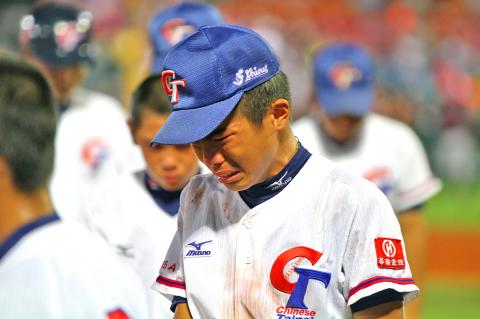Taiwan yesterday met reigning world champions the US in the WBSC Under-12 Baseball World Cup final in Tainan. Despite an early lead, a number of errors by the hosts and strong US batting helped them overtake Taiwan and hold their lead until the end.
At their previous meeting in a second-round game on Friday, Taiwan defeated the US 11-6.
Taiwan took the lead in the bottom of the first inning with one run and then increased their lead to 2-0 in the second inning.

Photo: CNA
Up until that point, things were looking good for Taiwan, but it all changed in the third inning, when the US rallied to turn the game on its head. In the top of the third, the US scored two points due to poor fielding by Taiwan’s Yang Chun (楊鈞) and the US’ Jack Ryan hitting into right field.
The US then increased their lead to 4-2 after short stop Davis Diaz scored a two-point home run. By the end of the inning, the US were leading hosts Taiwan 5-2.
In the top of the fifth inning, Ryan scored a home run to widen the US’ lead to 6-2. By the bottom of the sixth inning, the US had scored yet another run to secure their 7-2 victory, successfully defending their 2013 title by once again defeating Taiwan in the final.
The Chinese Taipei Baseball Association (中華民國棒球協會) said all 11,000 tickets were sold and Tainan Mayor William Lai (賴清德) attended the game to cheer for Taiwan.

The CIA has a message for Chinese government officials worried about their place in Chinese President Xi Jinping’s (習近平) government: Come work with us. The agency released two Mandarin-language videos on social media on Thursday inviting disgruntled officials to contact the CIA. The recruitment videos posted on YouTube and X racked up more than 5 million views combined in their first day. The outreach comes as CIA Director John Ratcliffe has vowed to boost the agency’s use of intelligence from human sources and its focus on China, which has recently targeted US officials with its own espionage operations. The videos are “aimed at

STEADFAST FRIEND: The bills encourage increased Taiwan-US engagement and address China’s distortion of UN Resolution 2758 to isolate Taiwan internationally The Presidential Office yesterday thanked the US House of Representatives for unanimously passing two Taiwan-related bills highlighting its solid support for Taiwan’s democracy and global participation, and for deepening bilateral relations. One of the bills, the Taiwan Assurance Implementation Act, requires the US Department of State to periodically review its guidelines for engagement with Taiwan, and report to the US Congress on the guidelines and plans to lift self-imposed limitations on US-Taiwan engagement. The other bill is the Taiwan International Solidarity Act, which clarifies that UN Resolution 2758 does not address the issue of the representation of Taiwan or its people in

US Indo-Pacific Commander Admiral Samuel Paparo on Friday expressed concern over the rate at which China is diversifying its military exercises, the Financial Times (FT) reported on Saturday. “The rates of change on the depth and breadth of their exercises is the one non-linear effect that I’ve seen in the last year that wakes me up at night or keeps me up at night,” Paparo was quoted by FT as saying while attending the annual Sedona Forum at the McCain Institute in Arizona. Paparo also expressed concern over the speed with which China was expanding its military. While the US

SHIFT: Taiwan’s better-than-expected first-quarter GDP and signs of weakness in the US have driven global capital back to emerging markets, the central bank head said The central bank yesterday blamed market speculation for the steep rise in the local currency, and urged exporters and financial institutions to stay calm and stop panic sell-offs to avoid hurting their own profitability. The nation’s top monetary policymaker said that it would step in, if necessary, to maintain order and stability in the foreign exchange market. The remarks came as the NT dollar yesterday closed up NT$0.919 to NT$30.145 against the US dollar in Taipei trading, after rising as high as NT$29.59 in intraday trading. The local currency has surged 5.85 percent against the greenback over the past two sessions, central